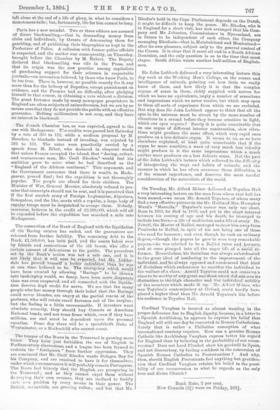On Tuesday, Mr. Alfred Milner delivered at Toynbee
every interesting lecture on the man from whom that hall has been named,—we mean Mr. Arnold Toynbee, of whom many find a very effective picture in the Sir. Malin of Mrs. Humphry Ward's "Marcella." Toynbee's career was only too short. Born in 1852, be died in 18B3, and yet in the short interval between his coming of age and his death, he Managed to include two lives,—a life of meditation and a life of study. Dr. 'Jciivett, the Master of Balliol; managed to draw him away from
Pembroke to in spite of his not being one of those who read for honours; and even though be took an ordinary degree,--'-thongla the papers he gave in were very remarkable papers,--he was selected to be a Bellied tutor and lecturer, and at once plunged into all the eager life of a social re- former. Nevertheless', his Socialism was always subordinated to the great ideal of conducing to the improvement of the individual, audhe always opposed andcondenmed that kind of Socialism which endeavours to sacrifice the individual to the 'welfare of a class. Arnold Toynbee could not conceive class to be worthy of anygreat sacrifices which did not,owe its distinction, to theligh character and th6 incliVidnid nobility of the members which made it up. Mr. Alfred Milner, who was Toynbee's contemporary at Oxford, could hardly haie placed a higher ideal than Mr. Arnold Toynbee's life before his audience in Toynbee


















































 Previous page
Previous page